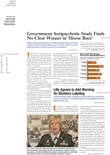Assessing soldiers for mental health problems upon their return from the war in Iraq is helping to identify areas where particular services are needed, according to Col. E. Cameron Ritchie, M.C.
Ritchie, a psychiatrist who consults to the U.S. Army surgeon general, addressed the military's response to mental health challenges at the annual Mental Illness Awareness Week symposium on Capitol Hill last month sponsored by APA and the National Alliance for the Mentally Ill (NAMI).
“We have been at war for four years, and we are tired, but we have learned a lot,” she said.
Among the mental health lessons the military has learned so far is the realization that troops suffering from combat-induced stress may display a wide range of reactions. That stress, she said, affects those deployed and their families.
The military has found that its attempts to improve the diagnosis and treatment of stress-related reactions in areas where combat troops are deployed frequently produced positive results among soldiers and Marines stationed in Iraq, according to the 2004 findings of the Army surgeon general's Mental Health Advisory Team, on which Ritchie served.
“We found things have improved, but more work is needed to improve access to care,” Ritchie said. For instance, the team found a 96 percent“ return to duty rate” among soldiers treated by military behavioral health care providers close to where their units were deployed. The team also found that a sufficient number of behavioral health personnel were deployed in Iraq and Kuwait overall, but the smaller, forward-operating bases were understaffed.
The armed forces also are trying to improve the mental health care available for soldiers after they return. The military's research found that among returning troops risky behaviors increase, as do substance abuse and domestic violence, Ritchie said.
A mental health program known as Post-Deployment Health Reassessment is in pilot testing at Fort Hood, in Killeen, Texas. The program, which will be applied to all active-duty and reserve units beginning in January 2006, aims to assess the mental health of soldiers three to six months after they return from combat deployment, after the so-called honeymoon period. The program intends to identify and treat soldiers with mental health problems that may not manifest for months after returning from combat.
According to the initial findings from the pilot test, up to 19 percent of soldiers and marines tested positive for mental health problems three to six months after they returned from Iraq.
Assessing the presence and significance of mental health problems in troops is complicated by the “redeployment window” in which they serve multiple combat tours, Ritchie said.
Military health officials continue to examine complicated questions, Ritchie said, such as what level of psychiatric symptoms should preclude troops from redeployment.
The “Mental Health Team Advisory Report” is posted at<www.globalsecurity.org/military/library/report/2004/mhat.htm>.▪
